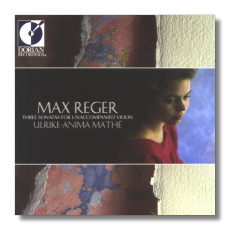
The Internet's Premier Classical Music Source
Related Links
- Reger Reviews
- Latest Reviews
- More Reviews
-
By Composer
-
Collections
DVD & Blu-ray
Books
Concert Reviews
Articles/Interviews
Software
Audio
Search Amazon
Recommended Links
Site News
 CD Review
CD Review
Max Reger

Sonatas for Unaccompanied Violin (1905)
- Sonata for Violin Solo in D Major, Op. 91 #2
- Sonata for Violin Solo in B minor, Op. 91 #4
- Sonata for Violin Solo in A minor, Op. 91 #7
Ulrike-Anima Mathé, violin
Dorian DOR-90175 60:14 DDD
This is an important release, simultaneously reviving some of the most important music for solo violin since Bach and announcing a major violinistic talent. Bach's shadow falls very clearly over the six Sonatas that originally made up Reger's Op. 91, for on reflection he added a seventh; as he wrote to his friend Karl Straube in 1905: "Bach wrote six; if I also come out with six solo sonatas, the screaming concerning the number 'six' will be apparent from the outset" (quoted in Susanne Popp's first-rate programme notes with this issue).
Reger's organ works, like his orchestral music, have often (and unjustly!) been accused of having cloying and congested textures. If that reputation has put you off trying his music, you can safely embark on this disc. As Dr. Popp explains, the restrictions of the medium stayed Reger's compositional hand: the thematic lines are often as clear as spring-water; the harmonies are generally consonant; the modulations less frequent than elsewhere in his output. And although there is contrapuntal ingenuity in abundance here – not least in the glorious Chaconne that closes the Seventh Sonata – it is melody, soaring, weightless melody that is the principal hallmark of these works, particularly in #2 and 4. The sense of humour that apparently perpetually attended Reger the man is also much in evidence – try the teasing affection in the Vivacissimo that closes the Second Sonata. Formally, too, these works are easily approachable: Reger was intent on expanding on tradition, not breaking with it. He was also relaxing, enjoying a busman's holiday – these solo sonatas were composed after the completion of his Sinfonietta, his first mature orchestral score.
It is obvious from the first bars of the Seventh Sonata that Reger's ambitions here are rather larger than in the two companion works on this disc. The opening Allegro energico, longer than any of the movements in #2 and 4, is immediately severer in tone (though still not at all difficult to listen to), with much more chordal playing as a result of the increased prominence of counterpoint – Reger is setting the stage for one of his supreme achievements in instrumental music, the Chaconne that brings the Op. 91 set to its magnificent end. He knew that Bach would be seen looking over his shoulder and, to mix a musical metaphor, pulled out all the stops to produce a work worthy of its model, the Chaconne from Bach's D minor Partita. He doesn't vainly try to outdo the master of the form; rather, he explores what else he can do with it, subtly allowing himself more and more liberty in his exploration of the eight-bar theme. The result, nearly a quarter of an hour in length, is a masterpiece of musical thought.
Ulrike-Anima Mathé is a real find, and she is served by an excellent recording. Born in Freiburg, she would seem to be in her early 20s (artists' blurbs are always terribly gallant, even in these unsexist days, about the ages of the ladies they describe; by the same token, I am not allowed to say that she is very attractive). She has a flawless technique, sailing effortlessly along in some cruelly exposed violin-writing. She responds marvellously both to Reger's gentle humour and his final contrapuntal monolith, although her tone is not a particularly big one. My only cavills would be that she occasionally seems to misjudge tempi – that Vivacissimo in #2 is only a Vivace in her hands, and the Allegro energico that closes #4 could be quite a bit more energetic – and that a more muscular tone would have brought the Chaconne up even grander. Small complaints in front of such a prodigious display of talent. I sincerely hope that Dorian will ask her to complete Reger's Op. 91 – as the first in a long series of recordings.
Copyright © 1993/1996, Martin Anderson


















